On Tuesday, May 29, Roseanne Barr posted the following tweet on Twitter: “Muslim brotherhood & planet of the apes had a baby=vj.” VJ, of course, stands for Valerie Jarret, a black woman born in Iran who served as Barrack Obama’s senior advisor during his presidency. Since that time (and likely fueled at least in part by ABC’s consequent decision to cancel Roseanne’s show), Roseanne has made many fitful moves toward apology, promising to swear off of Twitter and calling her statement an example of “bad taste,” only to return a few hours later to ‘apologize’ some more. Fortunately for Roseanne, supporters are emerging left and right to excuse her behavior.
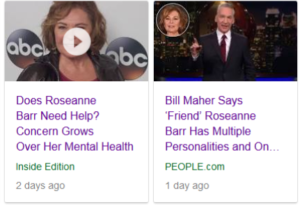 The most prominent excuse being offered is that Roseanne is “mentally ill,” and that her bigoted commentary is merely a ‘symptom’ of that ‘disease’. Some of her most devout supporters are also using this moment in time to figuratively dig up Robin Williams and suggest that the times when he made jokes that were fueled by racism and ignorance were apparently a product of his “mental illness,” too. If I were to follow their logic all the way through, perhaps I’d come up with something like this:
The most prominent excuse being offered is that Roseanne is “mentally ill,” and that her bigoted commentary is merely a ‘symptom’ of that ‘disease’. Some of her most devout supporters are also using this moment in time to figuratively dig up Robin Williams and suggest that the times when he made jokes that were fueled by racism and ignorance were apparently a product of his “mental illness,” too. If I were to follow their logic all the way through, perhaps I’d come up with something like this:
If bigoted remarks are a symptom of “mental illness,” and “mental illness” is a disability, and disabilities require accommodations under the Americans with Disabilities Act (ADA), then apparently allowing space for some such remarks becomes a reasonable accommodation.
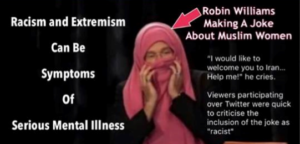 Perfect! White people needed nothing more in this country than another justification for racism. Because they’re just innocent victims. (It’s the black and brown people who are criminals and terrorists, right?)
Perfect! White people needed nothing more in this country than another justification for racism. Because they’re just innocent victims. (It’s the black and brown people who are criminals and terrorists, right?)
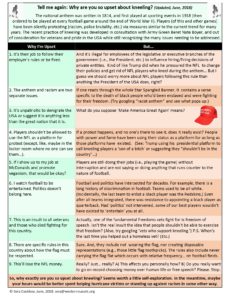 All this space-making for hateful remarks such as Roseanne’s comes less than a week after the National Football League (NFL) announced that players may now face penalties for failure to “stand and show respect” during the National Anthem, and the teams to which they belong can be fined by the league. (This is the same National Anthem that includes a whole section on slavery and celebrating the death of black people that is oh so conveniently forgotten by or unknown to most these days.) That’s right. While some are trying to give Roseanne a pass for her blatant bigotry, others are trying to punish those who’d quietly take a stand against its consequences by kneeling. You know… things like police brutality and death. (Click here or on the image to the left for more on the topic of the NFL and kneeling.)
All this space-making for hateful remarks such as Roseanne’s comes less than a week after the National Football League (NFL) announced that players may now face penalties for failure to “stand and show respect” during the National Anthem, and the teams to which they belong can be fined by the league. (This is the same National Anthem that includes a whole section on slavery and celebrating the death of black people that is oh so conveniently forgotten by or unknown to most these days.) That’s right. While some are trying to give Roseanne a pass for her blatant bigotry, others are trying to punish those who’d quietly take a stand against its consequences by kneeling. You know… things like police brutality and death. (Click here or on the image to the left for more on the topic of the NFL and kneeling.)
The truth: There is in fact a longstanding relationship between psychiatry and racism. But, it’s surely not that racism is a symptom of such a so-called “illness.” Rather, the truth is that psychiatry has long been used as a tool of racism. For example, Drapetomania (coined by Samuel A. Cartwright in the 1700s) was a psychiatric diagnosis for which the only symptom was an attempt to run away on the part of an enslaved individual. Or we can look to Jonathan Metzl’s work (among others) to demonstrate how Schizophrenia used to be a diagnosis most commonly attributed to white women (who weren’t conforming to the societal norms of womanhood at the time), and how it somehow mysteriously transitioned into largely a black man’s diagnosis during the Civil Rights era of the 1960’s. Suman Fernando, a British psychiatrist and black man who grew up in Sri Lanka, speaks well to the relationship between the two, as well, as does Joy DeGruy who has spoken powerfully about a phenomenon she calls ‘Post Traumatic Slave Syndrome’.
So, if we want to shine light on the relationship between psychiatry and racism, let’s start there. Or we can start by (or at least combine that effort with) shining light on the families and struggles that truly deserve to be lifted up. It is another example of racism and ingrained societal white supremacy that chatter about (and excuse-making for) Roseanne Barr is taking up far more space in our collective culture than, say, the murder of any one black or brown person (or, honestly, just about all of them combined) by police in our country.
So, enough about Roseanne Barr and other famous people who make such missteps and (frankly) help illuminate a much deeper problem. Enough of our idolatry. Our participation in raising up and centering her voice above all others, in spite of her acts to silence and other those already far more marginalized than herself. Enough of our using our backs and eyes and social media accounts to create her stage. If she’s struggling, let her do it privately and with the support of people she’s chosen in her life. I suspect she’ll be just fine without us.
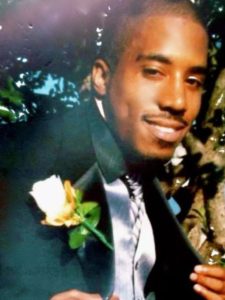
Let’s turn our attention instead to the people often getting overlooked. People like Dontre Hamilton.
The story of Dontre’s death and his family’s subsequent fight for justice is the focus of a documentary: ‘The Blood is at The Doorstep’, directed by Erik Ljung.
Dontre Hamilton was 31 when he was shot 14 times by police officer Christopher Manney in broad daylight in Milwaukee, Wisconsin on April 30th, 2014. Dontre’s crime was making an employee at the nearby Starbucks (yes, Starbucks… again) uncomfortable by quietly sleeping in Red Arrow Park, a place where he and his family have shared many good and peaceful times. It took three calls to the police on the part of that Starbucks employee before the police responded in person. Dontre’s murder was the result.
Dontre was a black man. He was also someone with a diagnosis of Schizophrenia. And what that Starbucks employee should have known… What we all need to know and integrate into our way of being and believing… is that calling the police on him (or on anyone who is a person of color and/or known to have a psychiatric diagnosis) was a threat of violence. The police — and the criminal justice system as a whole — are not prepared to treat people equally or fairly. This goes double for people of color and people with psychiatric diagnoses, never mind if you have both marks against you. Dontre died needlessly as a result. And although Christopher Manney was eventually fired from the police force, no charges were ever brought against him for his actions.
But another problem in our society is how people are remembered. People like Roseanne Barr are remembered largely for their strengths and gifts, while criticisms come and fade away. People like Dontre are all too often remembered as murdered black men with a psychiatric diagnosis… when they’re remembered at all. Even by the people trying to lift their stories up. And, so, I want to be careful to fight against that, too.
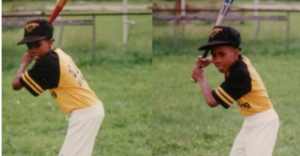
Yes, Dontre became one of many black men lost to police brutality and discrimination. But that matters all the more specifically because he was so much more than that. He was a full human. He was a brother, son, and father. In fact, Dontre was one of three brothers; known as both the youngest and the most contemplative. His father described him as thoughtful, and quiet until he got to know you. As a kid, he played little league with his brother, Nate, who was a bit older, but who — in many regards — was like his twin. As an adult, and in spite of any struggles he might have had at that point, Dontre was an 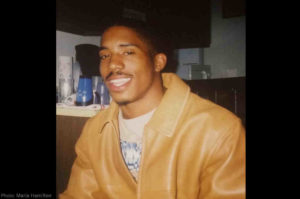 entrepreneur of sorts. He was often taking on odd jobs and business initiatives. In fact, he was responsible, at least in part, for Nate’s early involvement in home repairs work, something that Nate eventually turned into his own business. Dontre was also known for filling up the back of his car with ice and cold drinks to sell to people in the park where he was eventually killed. His last contact with his family was a voicemail he left stating that he was at the park. Members of his family have since commented that, at the time, they all thought, “Oh, he’s okay. He’s at the park. Everything’s fine.”
entrepreneur of sorts. He was often taking on odd jobs and business initiatives. In fact, he was responsible, at least in part, for Nate’s early involvement in home repairs work, something that Nate eventually turned into his own business. Dontre was also known for filling up the back of his car with ice and cold drinks to sell to people in the park where he was eventually killed. His last contact with his family was a voicemail he left stating that he was at the park. Members of his family have since commented that, at the time, they all thought, “Oh, he’s okay. He’s at the park. Everything’s fine.”
On Tuesday, May 22nd, 2018 I got to meet Dontre’s ‘twin’ brother Nate, as well as Dontre’s mother, Maria, and his eldest brother, Dameion, as a part of helping to coordinate two screenings of ‘The Blood is at the Doorstep’ in Massachusetts. They are a family of incredible strength. Nate is a business owner and father of five, as well as co-founder of the Coalition for Justice. He shares in the film that this experience has awoken him to so many truths about the world, and lit his passion for activism. His ease and affability have made him a natural for his role as family spokesperson. Dameion is a musician and father of three, as well as another founder of the Coalition. He was raised to be the protector of his two younger brothers. Though tending to be much quieter than Nate, he has great strength and confidence that shows through at all times. And their mother, Maria, shines as an open heart, desiring to learn, connect, and make as much change as she possibly can. As co-founder of Mothers of the Movement (bringing together many mothers who have lost African-American children to police violence) and founder of Mothers for Justice United, she has dedicated her life to fighting for a different, better, more just future for our children and communities.

The film itself is powerfully shot by Erik Ljung (who the Hamiltons now claim as a family member of sorts, too) over a three-year period, with a mix of personal interviews, family retrospectives of Dontre’s life, and footage of protests and other moments in the fight for justice since Dontre died. It asks the audience to face some of the harsh realities and painful times that come with facing a tragedy of this nature, right down to the excuse they were given by police as to why they waited over nine hours to notify the family of what happened: “We thought you would’ve seen it on TV.”
‘The Blood is at the Doorstep’ also asks tough questions about who our systems are truly made to protect, who gets to define ‘violence’ (see my ‘Baltimore is Burning‘ article for more on this), and who is truly left to pick up the pieces in the aftermath of a crisis (regardless of who the media might paint as the heroes or villains). It provides few answers, but demands from its audience at least the act of consideration of what role they might play in the fight for change.
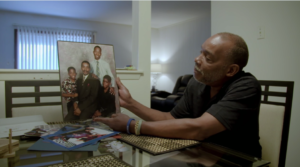
When Dontre’s family arrived in Massachusetts, they traveled in the wake of another great loss: Dontre’s father, Nate senior, had died just the week before. In fact, they had to adjust their return flight home to Wisconsin in order to be back on time for his funeral. When asked why they decided to still come to Massachusetts instead of canceling or rescheduling, they all said that it’s what their dad would have wanted. “Go take care of things,” he would have said, or something like that.
The decision to keep moving forward — to keep doing what needs doing no matter what — is a large part of what defines the Hamilton family. And it is an example for all of us. It hasn’t changed everything. Justice has still not been fully served for Dontre, although there have been some victories. In May of 2017, in the very same city, Adam Trammell (also a black man with a schizophrenia diagnosis) died after police tased him 18 times while he was naked at home in the shower. Video was just released of Milwaukee Bucks player, Sterling Brown, being tased by police after he was approached for having parked illegally in January of this year. (I was with the Hamilton family when they saw that Sterling had named Dontre in his official statement to the press about the incident, and how much they valued having Dontre remembered in that way.) But, it means something. It means a lot. And it’s up to us to be a part of carrying it all forward.
The last words of the last Massachusetts screening of ‘The Blood is at the Doorstep‘ (Springfield, May 24th, 2018) were spoken by Dontre’s brother, Dameion, who had otherwise been silent for much of the Q&A that followed that event. He stood and asked everyone in the room to stand with him if they’d felt affected by what they’d seen. Just about everybody stood. He then looked at all those standing, and said: “Good. Then, the blood is at your doorstep.”
The message was that this is now all of our issue. We can no longer claim to not know it or not be able to see. I hope that is a message that each person who was in that room carries forward, and that each of you who are reading this now will, too. The blood is at each of our doorsteps. Roseanne, the blood is surely at your doorstep, too. And, I hope all of us can now stop focusing on the whys of what Roseanne said, or worrying about the impact on her life that resulted. I urge each of you to stop giving that so much air time, and — as some small step toward making change — find a different voice and story to raise up. One that maybe doesn’t already have a built-in platform of fame and privilege.
Right now, I choose Dontre Hamilton, Nate Hamilton, Maria Hamilton, Dameion Perkins, and the ‘Blood is at the Doorstep’.
How about you?
For more about the Hamiltons and the ‘Blood is at the Doorstep’:
- To view the film’s official website: https://www.thebloodisatthedoorstep.tv/
- To view a trailer: https://youtu.be/sJLImV2KWjM
- To arrange for a screening: [email protected]
- To learn about Mothers for Justice: http://www.mothersforjusticeunited.org/p/about-mothers-for-justice.html
- To learn about the Coalition for Justice: https://www.facebook.com/justicefordontre/
- To watch a Q&A with the Hamilton family and Director, Erik Ljung: https://www.facebook.com/justicefordontre/
- To watch Maria testifying at a hearing convened by the Inter-American Commission on Human Rights: https://youtu.be/U5SvLoYX71M?t=8m3s
- To read ‘My Son Dontre’s Killing by Police was a Human Rights Violation’ by Maria Hamilton: https://www.aclu.org/blog/criminal-law-reform/reforming-police-practices/my-son-dontres-killing-police-was-human-rights















What does “someone with a diagnosis of “Schizophrenia”” mean?
I have “a diagnosis of
“Schizophrenia”” in the same way that my Doctor “is possibly a “wife beater”” i.e. I recovered many many years ago (from “Schizophrenia”) as a result of stopping medication suitable for “Schizophrenia”.
By Recovered I mean I stopped claiming Mental Health benefit and became independent, and was none the worse for doing this.
I’m having a pop at the expression (not anything else) – because it’s an expression that is frequently misapplied,
Report comment
It’s just a statement of fact- Dontre Hamilton was given a diagnosis of “schizophrenia” by the mental health system. The author didn’t endorse the concept of “schizophrenia,” she just reported a fact.
Report comment
Fiachra,
It means they were given a diagnosis. I quite intentionally use that language when stating a diagnosis that is relevant to a story or circumstance because being given a diagnosis is a fact (if someone in fact was given one by a doctor, psychologist, etc.), but what that means or why is left open.
For example, I was personally given a diagnosis of Borderline Personality Disorder. Can’t deny that. I sat before a therapist. They wrote it in my chart. But that still leaves space for me to say ‘and it was bullshit, and means nothing to me beyond the pain it caused me in the system.’ It’s fundamentally different than saying someone ‘has’ or ‘is’ a diagnosis in that way. It was relevant to mention here because the fact that Dontre was so diagnosed influenced how people, including the police, saw, interacted with, and spoke about him. It makes no claim about who he was or why.
I certainly hope that is not all that you got out of this. I quite intentionally didn’t make this yet another article that goes on about the injustice of the labels themselves because I believe it’s clear in what I did write (for example, in the paragraph where I name some of the relationships that have existed between racism and diagnosis) that there is a problem. The main focus deserves to not be lost.
-Sera
Report comment
How did the police know Dontre Hamilton had a diagnosis of “schizophrenia” Sera? That doesn’t show like skin color. I’m sure his poverty (homeless!) played a role too.
Report comment
Rachel,
As I understand it, Dontre was *not* homeless. He was simply resting in a park in the middle of the day. I believe there was a report that went out stating he was homeless, but I believe that that was an erroneous assumption (and likely an assumption worth examining the roots of).
I don’t actually know if Christopher Manney knew of Dontre’s diagnosis when he interacted with him. But I do know that how they painted Dontre afterward was skewed by that fact… (Check out the film if you have a chance.)
Report comment
Sera, thank you for calling out the widespread and offensive belief that racism is a “mental illness.” And thanks especially for successfully turning the spotlight from an obnoxious white celebrity to the systemic racism that led to murder by police of a black man with a psychiatric label.
Report comment
Thanks for reading and commenting, Darby. 🙂 I hope that others will get involved in turning the spotlight, too. 🙂
-Sera
Report comment
What? You mean Robin Williams wasn’t everything Leah Harris made him out to be?
Great and necessary article, Sera. Thank you for posting it.
Extremely self-indulgent celebrats and rich people make the news a lot, don’t they? Surely, there is a better side to our country than what so often gets the attention of the star struck mass media. Plus, here’s the other side of ‘cop killers’, that is, killer cops, and given the rampant racism in this country, killers that get off scott free as a rule.
We need to make black lives matter, and then maybe we can help some of those other lives marginalized in this country matter a bit more, too.
Report comment
Thanks, Frank. 🙂 As with so many things, I don’t see this country suddenly ceasing to focus on the ‘celebrats’ as you so aptly put it, but we can definitely try and do our part. 🙂
Report comment
For all it’s emphasis on racial “diversity” Starbucks sells overpriced coffee as a status symbol for rich people. I don’t hate rich people.
But selling super expensive items just to help people show off their money bugs me a little. No wonder Starbucks employees dislike and fear the homeless.
Report comment
ALL Starbucks employees? I have met many Starbucks employees who appear to be decent or even very interesting people. While I am not a black person and can’t say I’ve been able to directly test out your comment, I’d say it is important not to overgeneralize about people just because they happen to work at Starbucks. Which takes nothing away from your argument that “designer coffee” joints like Starbucks definitely promote snob appeal and elitist attitudes to sell more coffee for more money.
Report comment
I think it may say more about you than about Starbucks that you think the sole reason anyone sell or buys that product is as a status symbol. I’m not saying the coffee is cheap (it isn’t, & the average Starbucks customer is upper middle class or richer), but it’s far, far from the upper echelons of coffee snobbery. It’s more the Target or WalMart of coffee snobbery. Where I live, which is a place with a big coffee industry, the idea that Starbucks is the “snobby” coffee is laughable—most people with any idea of using coffee as a status symbol would be slightly bashful if you caught them with Starbucks in hand.
In the past few decades the coffee industry has gone through a lot of changes, which means that treating it less like a commodity and more like a craft product is “the new normal”—it’s no more or less a status symbol than drinking a pint of beer brewed anywhere outside of Milwaukie, Wisconsin.
On the other side of the counter…40% of Starbucks employees are POC and they make an average of $9.43 an hour.
Report comment
Glad I tip them when I do pay a visit. 🙂
Report comment
I haven’t read the body of Sera’s blog yet because I need to talk about Roseanne.
Roseanne made a mistake — she didn’t realize Valerie Jarrett was Black; read her Twitter feed. This of course is inconvenient to the narrative, which is that since she was a “strong Trump supporter” this is clearly nothing more than an incident of white racism, and that Roseanne must be now targeted as a “racist” for liberals to pillory, thereby sidestepping their own racism. (Funny how Harvey Weinstein is never cited as a “strong Hillary supporter.”)
As for Valerie Jarrett and “teaching moments” — I will be doing more research on Jarrett but it does appear that she could be termed Obama’s “blood whisperer,” advising him on the war crimes he engaged in in continuance of GWB’s legacy, including the horrific murder of Khadafy and destruction of his country. It appears that she should be standing before the International Criminal Court along with both Clintons, both Bushes, and Obama. She is also no doubt considered a traitor to her homeland Iran by many of its citizens.
Meanwhile the Roseanne show, which was the most intelligent sitcom on TV and was making significant inroads towards bridging the gap between Muslims and working class Americans, treating gender issues in a sensitive way, and in general getting people to think outside their personal boxes, is kaput. Can’t have that stuff going on.
Roseanne’s basic crime was disrespecting neoliberalism (and i’m sure the libs didn’t forget her previously-deleted email calling Hillary a war criminal). The faux-“left” has once again proven its hypocrisy. All white Americans are racist to some degree, which they don’t want to acknowledge, preferring to project their condemnation outward.
So bring on the brickbats — I’ll match my anti-racist “credentials” with anyone’s. And I’m glad I finally found a place to vent about this.
Report comment
I do hope you’ll take this elsewhere, Oldhead. I didn’t know that Roseanne was a Trump supporter at the time I first heard about her Tweet, and I certainly didn’t have to have that in my head to hear her comment as pretty blatant bigtory. I don’t care if she is or isn’t a Trump supporter. It’s irrelevant. And.. If she didn’t realize that Valerie was black… Well, I don’t even know what to say about that. I find it hard to believe, even if she’s now claiming it.
More than anything, I really don’t appreciate this article being turned into a ground for strange political arguments and insults. This isn’t what all this is about. It’s more important than that.
Report comment
What’s strange, that I looked up the facts? She was also taking Ambien. And she apologized immediately, before most people even knew about it. (Can’t help but noticing you use the first name “Valerie” rather than Jarrett, as though she’s obviously our buddy.)
I’d be happy to “take this somewhere else” if you changed your lead-in; what is the connection between Roseanne and the rest of the article? The worldwide reality of racism? That Roseanne is racist and the rest of us aren’t?
Report comment
I called everyone in the article by their first name, as best I recall. Yes, I referred to Trump as Trump… That’s just habit, I guess. But typically, I go for first names.
And no, I will not be changing my lead in. It is what it is. I don’t know if you’ve actually taken the time to *read* the article at this point, but one of my points is that racism is *systemic* and Roseanne’s comment is merely illuminating that fact. She’s not so different than many people in the country, and as you know very well, I’m someone who believes that all white or white-presenting people have benefited from racism and white supremacy in this country, so it’s far more complicated than Roseanne being any sort of villain. However, I do absolutely believe that consequences for such overt racism are merited and necessary to initiate any sort of real change…
MOST importantly, though, the point of the article is that it’s *absurd* to try and excuse her behavior as a symptom of ‘mental illness…’ That that’s wrong on many levels. And that the rush to focus on her while we’re still ignoring the voices and stories that deserve to be heard is a problem.
This is the last time I’m replying to you on this. I find it disrespectful to come onto articles – especially articles that expressly make the point about how important it is that we shine the line on the people who deserve to be lifted up – and attempt to derail things in this way.
Report comment
It’s not fair of you, Sera, to accuse oldhead of making this article/comments section into “a ground for strange political arguments” when the entire articles is written from a very specific and overtly political P.O.V.—yours. There’s nothing wrong with that, except that you clearly think that your personal politics are objectively correct, while everyone else’s are “strange” and inappropriate.
You say that one of your points “is that racism is *systemic* and Roseanne’s comment is merely illuminating that fact” but focussing on one individual woman’s personal racial attitudes is literally *the exact opposite* of talking about systemic racism. Systemic racism is institutional racism.
Liberals constantly make the mistake of thinking that racism is about the personal attitudes & likes/dislikes of individuals. Those things are part of the landscape of living in a profoundly racist society, but they aren’t what systemic and instituonal racism is.
Those with political views further to the left than yours have identified this misplaced focus on changing individuals’ personal views and attitudes. We call it “idealism.” Larger structures than individuals create, shape, and reinforce racist attitudes in individuals as they go about their primary objective: to build and maintain a system that extracts material resources from some (POC) and directs them to others (whites). Trying to change this root problem, which is material, by going nuts over the attitudes and random twatter that comes out of individuals’ mouths is simply an exercise in futility.
It’s okay to be a liberal idealist, but please understand that not everyone else with a dog in this fight is one—a lesson white liberals desperately need to learn right now is that not everyone with great intentions and deeply-held values about equality and anti-racism shares their political views. There is diversity and complexity here, among people who are all staunchly anti-racist.
There’s also something deeply bizarre with the idea that “the Blood is at” Roseanne’s “doorstep.” You may, as a white woman, feel that this extreme stance is really putting your weight behing the noble cause of supporting POC. As a POC, I can tell you that I find it profoundly weird that you would compare one comedian’s offhand, ambien-fuelled comment on Twatter to things like redlining, slavery, Jim Crow laws, lynchings, police brutality, etc.
And, yes, EVERY white person raised in this society has some racist thoughts in their head. Most (those who “are not racists”) do not identify with those thoughts or “want” to have them, or “believe” them. But if you lower people’s inhibitions and their CNS control, this shit *can* pop out BECAUSE WE LIVE IN A RACIST SOCIETY.
Report comment
Make of it what you will, meremortal. Oldhead came in here, openly acknowledged not reading this article, and then proceeded to make the whole thing about Trump verses liberals which has absolutely nothing to do with anything I wrote. I know what happens around here when people do that. It has the potential to throw the entire comments section off track, and, yes, I find that disrespectful.
It also seems to me that you’ve misunderstood much of what I’ve said here. I certainly didn’t compare her commentary to those things. What I actually said was:
A) It is ridiculous that people are trying to excuse her behavior under the defense of ‘mental illness’.
B) That, yes, there is a history of ties between psychiatry and racism, but that it is of a very different nature.
C) That while, yes, Roseanne’s behavior shines a light on a much deeper and more serious issue of racism in this country, our focus would be much better served on the people and stories worth hearing about… That focus on a famous person’s offensive comments aren’t where to put our attention.
So, while you seem to have read what I wrote, I’m not sure you’ve taken time to understand. That’s fine. At least you read it. Thank you for that.
Report comment
Just one last quick note:
When you say this “There’s also something deeply bizarre with the idea that “the Blood is at” Roseanne’s “doorstep.” You may, as a white woman, feel that this extreme stance is really putting your weight behing the noble cause of supporting POC. As a POC, I can tell you that I find it profoundly weird that you would compare one comedian’s offhand, ambien-fuelled comment on Twatter to things like redlining, slavery, Jim Crow laws, lynchings, police brutality, etc. ”
It really makes me wonder if you’re misunderstanding how the phrase is getting used? As I understood it when Dameion stood at one of the screenings and told the audience the blood is now at all of our doorsteps, it was more about not being able to ignore what’s happening in the world… Not an accusation that we are each responsible or any sort of direct cause so much as a call to action, to not look away, to face the challenge of making change… Again, I’m not sure you’ve taken the time to understand what I offered here, but I at least wanted to be clear about that point.
Report comment
(would have replied to your later comment, but I guess the nesting comments have reached their limit)
Sera, Thanks for that clarification about the “Blood is At Your Doorstep” comment. You’re right about that and I take back what I said on that point.
I do think that overall I understood your piece, but we have different focuses and different orientations. I think my main issue is that you sort of want this to simultaneusly be “political” and not to be political at all. That’s tough to swallow.
I think it’s tough for both sides because liberals DID have a vendetta out for Roseanne from way before this incident, namely because they believe that she is Trump supporting conservative, and they can’t stand that. Roseanne is actually a complicated figure (who I dont pretend to understand) who was a left radical for much of her life, a professed socialist and feminist. I dont understand how she got where she is today. But liberals did hate her because she dared show that sane people (on the show, I’m not including Roseanne herself in real life in that lol) can disagree about politics.
Report comment
Fair enough, meremortal. I would have balked less had Oldhead not begun his entire commentary by stating flatly that he hadn’t read anything I’d actually written… 🙂 As an author here, it can be very frustrating to have people come in and immediately go off topic. It can, unfortunately, change the whole energy of the piece.
-Sera
Report comment
(I should add that – as aforementioned – I know zero about Roseanne’s politics, and have never seen the new version of her show so I have literally no opinion on any of it. I’m simply responding to her comment, and the subsequent effort to excuse it as ‘mental illness’.)
Report comment
OMG Meremortal where have you been all our lives here at MIA?! Maybe I don’t need to add anything? (Fat chance.) You should probably mention for the record that we have never once met or communicated before. I was actually very nervous that I would return this evening and there would be zero understanding of what I was trying to communicate, so this is a very encouraging response to read right off the bat.
Lest there be any confusion, this is not a “defense” of Roseanne’s comment (this is the last time I will feel compelled to say this); it was pretty stupid, like the kind of thing you say on psych drugs, plus she was handing her head on a platter to her neoliberal enemies and other haters. This is an indictment of liberal hypocrisy and the belief that any white person in america is not racist in some way; those who believe this about themselves are generally the most racist but only recognize racism when they see it in others.
Report comment
Oldhead came in here, openly acknowledged not reading this article, and then proceeded to make the whole thing about Trump verses liberals which has absolutely nothing to do with anything I wrote.
This is an emotional and defensive misreading of what I said. I said I had not read the main body of your blog yet because the Roseanne angle immediately demanded some clarification and response; as it turns out I had read much of the body, and in any case have since finished it.
The entire backdrop of the Roseanne saga is liberals and neoliberals vs. Trump, btw, it has nothing to do with what I think. By using it as an attention-grabbing segue you distort whatever message you may have been attempting to convey about police murder of Black people.
I keep hearing about “systemic racism” but I never hear that system named, or an analysis of how it might be defeated. Nor do I EVER hear ANYONE at MIA even pay lip service to the many Black (and other) political prisoners who have been rotting in U.S. prisons since the 60’s and 70’s for actively fighting this system, people like Mumia Abu-Jamal and Leonard Peltier, both of whom they are in the ACTIVE process of trying to murder as we contemplate the vagaries of white privilege on our laptops.
Report comment
We’ve had demonstrations here in Florida, against prison slavery, and in solidarity with striking prison inmates, including one in front of Coleman Penitentiary where Leonard Peltier is currently being held. I’ve taken part in a couple of these events, if you were looking for a regular at MIA involved in this sort of thing.
Report comment
Props to you for that, Frank, absolutely. That makes one I guess. Though whatever you are you’re not the sort of “liberal” I was referring to. You might even object to the term.
By “we” do you mean a specific org or people in general?
Report comment
I agree with Sera of course that the Roseanne episode should be taken out of the realm of psychiatry. Bill Maher and the others are acting stupid and ridiculous with that shit. But my belief is that survivors should be coming to her defense against these attempts to psychiatrize her, not further pillorying her. The totalitarian neoliberal mob, for their own reasons, want to make her a symbol of racism and tie her to the whipping post to deflect attention from their own crimes. I don’t think it’s extreme to say they would like to see her driven to a heart attack or stroke or SSRI zombiehood as punishment for trying to bridge the culture gap. I think it is our duty to expose this and prevent what I would consider a premeditated social media murder.
Didn’t we just have a discussion here about the toxic effects of “shaming”?
Report comment
Well, there was a organization formed not that long ago, specifically to tackle the issue of conditions in prisons. Gainesville has it’s own bunch of progressively minded individuals, and, of course, I’m with them. A lot of these events revolve around the Civic Media Center, our local radical library, and a gathering place for like minded politically engaged people, millennials, peace movement veterans, and socialists of all stripes.
Report comment
Ambien maker responds to Roseanne Barr: ‘Racism is not a known side effect’
https://www.theguardian.com/culture/2018/may/30/roseanne-ambien-racism-tweet-side-effect-response-sanofi?
Report comment
Yes, a cute PR response designed to change the subject from the known effects of their products. I’ve been wondering why more people haven’t jumped on this as an example of the treacherous nature of the pharmaceutical cartel.
Report comment
Julie Greene blogged about Roseanne’s ambien use. That does play a role since ambien probably breaks down inhibitions and may be indication of anxiety or unhappiness to add to the “mental illness” nonsense.
I know a woman who excused her husband’s abusive behavior saying, “He can’t help it. He’s bipolar.” Another woman excused her friend’s son cursing his mother in public so she had heart problems. “He can’t help it. He was off his ritalin.”
I argued with my friend a little too harshly. “He cussed her out because he was angry and disrespectful. Now Jan, what ‘medicine’ on earth can cure those bad behaviors?”
(I know he probably had a headache from withdrawal. But Jan believed the “meds” turned bad people into saints. When I demanded how pills can reform bad character she hemmed and hawed before admitting they really couldn’t.)
Now they probably will add racism as a “symptom” for “illnesses” already invented by shrinks. Like Bipolar, Schizophrenia, and maybe BPD as well. Not only does this provide a handy excuse for spewing nasty stuff, “I can’t help it I shouted racist epithets at the restaurant last night. My meds for my Bipolar need readjusting,” but it will make the “bipolars” (or whatever) automatically accused of racism.
Guilt by association. And shrinks will gladly use it as a marketing tool. Phooey!
Report comment
Rachel777,
Thanks for reading and commenting. I agree it’s a dangerous road to go down for so very many reasons.
-Sera
Report comment
It doesn’t matter what color your skin is. Too many officers are too angry.
I think the police have to be screened for their psychological likelihood to be too angry.
Pinkish looking colored skin deaths
https://en.wikipedia.org/wiki/Robert_Dzieka%C5%84ski_Taser_incident
https://en.wikipedia.org/wiki/Death_of_Sammy_Yatim
http://www.cbc.ca/news/canada/hamilton/news/andreas-will-never-be-forgotten-chinnery-family-reflects-after-inquest-1.3487771
Report comment
Markps2,
Certainly there are issues with the police, their training, their focus, power, and so on. It’s a multilayered issue for sure. But, it would be a mistake to say that color doesn’t matter. It certainly plays a role.
-Sera
Report comment
Racism is being kept alive for the purpose of divide and conquer. At this stage of development they need the masses to believe that our police state problem is a racism problem. The social engineers are hard at work.
Look online at the photos from the Eric Garner protests, it was people of all colors, they knew they were in trouble when the scene is the people vs oppressors so they quickly had their major TV fake news networks say racism 1000 times a day and the people started buying it, suddenly its race vs race instead of freedom vs tyranny. Divide and conquer works.
It really doesn’t matter anymore cause there is no turning back, the police state technocracy is built and up and running. They never say we went to far so here is some of your freedoms back.
Chinese man caught by facial recognition at pop concert – BBC News
http://www.bbc.com/news/world-asia-china-43751276
Apr 13, 2018 – Shenzhen police can now identify drivers using facial recognition …
http://www.scmp.com › Tech › China Tech
Apr 25, 2018 – Expanded traffic surveillance programme in Shenzhen will identify and fine violators, including those driving without a valid license.
People are sheep and they are going accept the police state technocracy world wide as older generations die off and the newer ones just accept it as normal. Equality is going to be when everyone is equally a slave to the beast machine.
Report comment
The thing is that acknowledging racism does *not* mean we can’t also acknowledge collective fights. It also doesn’t need to mean that it’s ‘race against race’. In fact, the Hamiltons said many times while they were here that we’re all in this. We’re all being affected.
It’s also possible to acknowledge racism in a way that isn’t all about blame. I benefit from white privilege. I benefit from white supremacy. That doesn’t mean it’s me vs. black people, or that I’m operating with intent with any of that. Often there’s power to be found in acknowledging these issues honestly.
-Sera
Report comment
Cat — Good observation about the protest. During the L.A. rebellion angry people of all races were actively particpating, even though it was characterized only as Black people.
Report comment
Black Lives Matter.
What’s very noticeable in the UK is the over categorization of so called “Schizophrenia” in 2nd/3rd generation Caribbean People in comparison to the UK population in general and to the Caribbean.
In my opinion this phenomenon is discriminatory and inaccurate as 1. Cultural behaviour expectations would be higher in the Caribbean than in the UK; and 2. Most of the categorized “schizophrenia” is not “schizophrenia” and wouldn’t be judged to be “schizophrenia” by even the average UK person.
Whats also noticeable is the high “UK Psychiatric death rate” of young Afro Caribbean men.
Report comment
Thanks for reading and commenting, Fiachra! Are you familiar with Suman Fernando? (Named in the article above) He speaks a great deal to what you’re referencing in the UK.
Report comment
Thanks Sera,
I looked up Suman Fernando, and he might be doing his best.
It’s not an intellectual problem though, it’s a UK Civil Rights problem. The evidence is clearcut.
My own experience is that once a person cooperates with the Mental Health system, that they eventually become genuinely mentally ill.
Report comment
Yes, well, you’ll get no argument for me on it being a rights/political issue, rather than an intellectual one… Although, I think we all fall into our own intellectual traps much of the time for lack of seeming to have any truly effective way to make satisfying change.
Report comment
“We’ve” done reasonably (well) on women’s rights in the past 100 years!
No1.
There’s clear cut miscategorization in the UK of “Schizophrenia” on racial grounds. – True (and accepted)
No.2
The Mental Health treatments turn people into longterm psychiatric patients. – True (but denied).
No.3
It’s possible to Completely Recover with the right type of help. – True (but not understood).
Report comment
SCHIZOPHRENIA:-
It’s Possible to Completely Recover.
https://www1.bps.org.uk/networks-and-communities/member-microsite/division-clinical-psychology/understanding-psychosis-and-schizophrenia
“..An overview of the current state of knowledge in the field, concluding that psychosis can be understood and treated in the same way as other psychological problems such as anxiety or shyness…”
Edited by Anne Cooke
Contributors include:
Thurstine Basset; Professor Richard Bentall; Professor Mary Boyle; Caroline Cupitt; Jacqui Dillon; Professor Daniel Freeman; Professor Philippa Garety; Dr David Harper; Dr Lucy Johnstone; Professor Peter Kinderman; Professor Elizabeth Kuipers; Professor Tony Lavender; Laura Lea; Eleanor Longden; Dr Rufus May; Professor Tony Morrison; Dr Sara Meddings; Professor Steve Onyett; Dr Emmanuelle Peters; Professor David Pilgrim; Professor John Read; Professor Mike Slade; Yan Weaver; Professor Til Wykes
I don’t mean to wander off here, it’s a “Point” that needs to be communicated.
Report comment
oldhead, you are right and wrong—I don’t know you at all, but we have interacted here on MIA in other articles’ comments sections before.
But, yah, we seem to tend to agree on a lot! Do you blog? I’d read it 🙂
Report comment
Sorry, I guess it’s been awhile. No blog per se — but do you have a public email or other way to contact you?
Report comment
Whoa Meremortal — Just looked at your comment history and see you’ve been here longer than me, at least back to 2013! But you have been VERY judicious in your posting and have only 82 posts in all (I think I may be pushing 5000) so they are interspersed to the degree that your “handle” didn’t register with me. I see we have indeed often conversed (and often agreed), and remember some of those discussions well. (Though all I was speciously trying to establish in this case is that I didn’t put you up to posting that supportive comment.)
Report comment
Yes, I’ve been around a long time! I guess I do post rather judiciously… I don’t try to spend too much time on the computer, although I do find value in the articles here and the discussions as well.
Would love to hear from you if you’d lke to email! You can reach me at: [email protected]
Report comment
Now to get back to the ostensible subject, i.e. police murder of Black and other poor people.
‘The Blood is at the Doorstep’ also asks tough questions about who our systems are truly made to protect
I would have to see documentary to really understand the political message it is sending. But in response to “questions” such as Sera asks above, I would say — and this applies to psychiatry too — why are “we” (white people?) still “asking questions” about who runs this system when the answer should be eminently clear? Do we really have to prove that racist police murder is a “human rights violation” (when it is actually far more)? Why aren’t we talking about how to upend and abolish the corporate racism and genocide upon which this system (the one responsible for “systemic” violence and racism) depends, and put the system to bed for good?
Reading Dontre Hamilton’s story brings to mind a song written about 50 years ago by Phil Ochs entitled “Too Many Martyrs,” check it out:
https://www.youtube.com/watch?v=lkfgJG5kyQg&index=1&list=RDlkfgJG5kyQg
All I have to add is, why are we still asking the same “questions”?
Report comment
I’d encourage you to watch it, Oldhead. I think you’re right, we don’t need to keep asking… And in fairness to the film, it doesn’t overtly ask. It’s pretty smartly constructed. But it does put the viewer – many of whom will not have come to the same conclusions as you already – to give thought to those points.
Report comment
Is it viewable online or what? Any chance of PBS?
Report comment
Hi Sera. Thank you for writing this article. Dontre Hamiliton’s story (and Ezell Ford’s, and Sandra Bland’s, and Philando Castile’s, the list of lives lost would overflow this page) brought on the familiar despair and anger that these stories generate when I hear or read them. His life had value, but systemic racism brutally cut it short.
Black people have been having these conversations and crying tears over these deaths for hundreds of years. We have fought for recognition of our rights for around the world and cannot continue to do the bulk of the screaming by ourselves. I applaud and support white people who have the courage to speak out against injustice in all its forms, especially in a world that coldly silences dissent. More white folks who despise these horrors need to have these conversations with their white families, partners, friends and co-workers who continue to turn a blind eye to the plight of black people.
Roseanne’s dehumanizing dog-whistle has everything to do with slavery, Jim Crow, and other horrors of the past: it’s a byproduct of it. That she could tweet these insults against a black woman (I don’t buy her lies that she did not know that Valerie Jarrett was anything but black) and still receive support from both conservatives and liberals under the guise of concern for her “mental health” is from a playbook older than all of us. By calling the humanity of Valerie Jarrett into question, she makes it easier for others like her to question the humanity of black people as a whole. That’s how systemic racism works. The power to define is the power to control.
All white people are not racist. Are many complicit in perpetuating this unjust system with their silence? Yes. Do these same people honestly believe white people are the superior race (the definition of racism), not all of them. Prejudice, which we all deal with, does not equal racism. Prejudice is a hell of a lot easier to heal.
More white people need to have these conversations and I am glad that MIA, through selecting this article, will inspire some within the anti-psychiatry and critical psychiatry movement to address these issues both online and in real life.
The people united will never be divided!
Report comment
All white people in America are racist to some degree, however repressed or “unconscious.” Those who think they aren’t racist are often the most racist. No, prejudice does not equal racism, racism requires power; in fact it is sometimes described as prejudice+power. This is why Blacks can be prejudiced but not racist.
Valerie Jarrett is complicit in the racist imperialist murder of thousands of African people, and the destruction of their countries and economies. As I said before, as Obama’s foreign policy advisor she should be on trial before the International Criminal Court, along with both Clintons, both Bushes, and Obama, to start. Talk about systemic. Jarrett’s alleged “humanity” (or lack of it) should be judged based on her actions, not her race; any way you look at it she is not someone to be admired, to say the least.
Meanwhile, speaking of prejudice, you trash someone you don’t know at all as a liar. What basis do you have for this?
Calling Meremortal!
Report comment
oldhead is right about psychiatry and antipsychiatry, but on this particular topic, i.e. racism, I’m afraid that his arguments are unpersuasive at best
Report comment
Sera, thank you for another great opinion piece which helps me digest what’s reported in the media, written from your strongly informed social justice perspective. I appreciate the links you shared, enabling readers to learn more about the topic and create a screening in our own communities.
Report comment